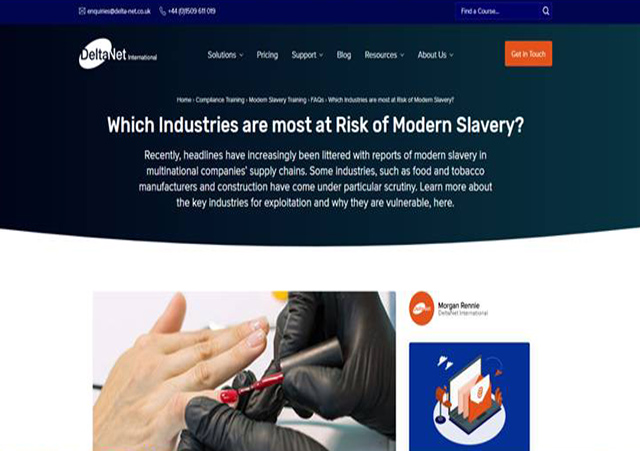 DeltaNet International web page on modern slavery.
DeltaNet International web page on modern slavery.
[This is an excerpt from an abridged version of the 2021 Anthony Low Commonwealth Lecture delivered in Canberra which appears in The Round Table: The commonwealth Journal of International Affairs.]
The persistence of slavery despite all these efforts points to a deeper problem. To understand the challenge of modern slavery and how to combat it, we need to understand the psychology of the perpetrators and the victims. A study by the University of Manchester in the UK provided some surprising insights. It analysed 540 reports of modern slavery crimes between 2015 and 2018. About 50% of the crimes related to sexual exploitation while 25% related to forced labour, including the cultivation of marijuana. There were 288 suspected perpetrators – 70% male, 30% female. The age range of suspected perpetrators was 11 to 75 years, which seems extraordinary.
That is explained by the use of very young children in forced begging operations, and where an older child would be responsible for the teams. In the University of Manchester analysis, the age of victims ranged from six to 73 years old, with 61% adults and 39% minors. It seems that perpetrators of modern slavery often follow the same psychological process as those in ancient times. From the Mesopotamia era to the current day, that process has involved the dehumanisation and devaluation of the humanity of those exploited.
Ancient cultures depicted conquered people as less then human, which established a permissive environment for exploitation. A significant part of the dehumanisation process was to depict or perceive those not from your cultural or social system as outcasts, and thus somehow deserving of oppression and requiring control. Those who were illiterate or with no family support networks were made to feel inherently less than the equal of their oppressors.
The potential for financial gain is the single most powerful motivating factor of those enslaving others. A study by the University of Denver found that the key to combatting modern slavery was through market-based mechanisms. The study identified slavery associated with massive profit, vulnerability, and a lack of enforcement as key areas of focus. It also identified wealth disparity as an important driver of human trafficking that could be addressed through appropriate economic and trade policies.
WalkFree estimates there are $354 billion in products imported by G20 countries at risk of modern slavery in their supply chains. Industries considered at high risk include those involved in agricultural production of rice, spices, tea, coffee, cocoa and cotton. The clothing sector, particularly when it involves leather and fishing industries are also considered high risk.
WalkFree warns that the economic impacts of the Covid-19 pandemic increase the number of people vulnerable to modern slavery and human trafficking. While Covid is hopefully a short-term disruption, there are other mega-trends at work that will disrupt the lives of all people in the medium and longer term, and could add to the problem.
The fourth industrial revolution, the technology revolution, has transformed the way we live, work and communicate. Yet analysts warn we are only at the start of that process. The World Economic Forum Future of Jobs report shows that business across the world anticipates significant changes to their workforces, as technology automates some tasks and augments others.
That report forecasts millions of people losing their jobs in coming years, although there is hope that a similar number of new roles will be created. Partnerships between the private sector and government will be vital in ensuring this process does not disproportionately impact on the most vulnerable.
A second mega-trend is climate change, with far-reaching implications for people around the world. Climate change risks the livelihoods of those involved in agriculture for example, particularly when they lack the resources to move to other locations. The International Labour Organisation estimates that 1.1 billion people are in the agricultural sector, which means even small disruptions place large numbers at risk.
A third mega-trend is the increasing competition between the United States and China. Great power struggles have historically drawn in other nations, as each side rallies alliances and support networks. In the past, Australia and other nations have maintained a stance that we do not need to choose between our largest trading partner China and our primary security and investment partner the United States. However, such choices are increasingly being imposed on nations and that risks creating divides in technology, infrastructure and more.
Again, this has the potential to place more people at risk, should there be a decoupling of the world’s two largest economies and disruptions to the free flow of trade and capital.
The complexity of these issues and matters relating to supply chains place a greater responsibility on individual consumers in developed countries in particular. We must demand supply chain transparency and accountability, and use our purchasing power to influence company decisions. Governments can mandate reporting, however the power lies with the consumer. If we collectively demand higher standards from industry, business, retailers and more, and have our values guide our decisions, we will see real change flow back down through supply chains to some of the most vulnerable people in the world.
Julie Bishop was the Minister for Foreign Affairs of Australia from 2013-2018.



